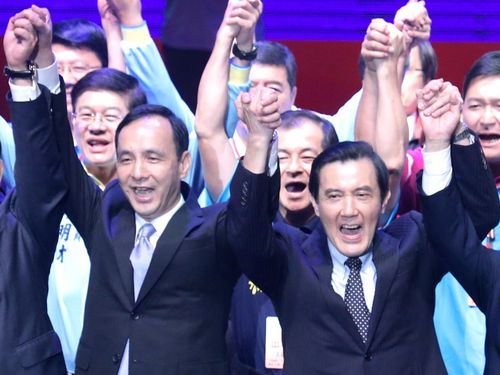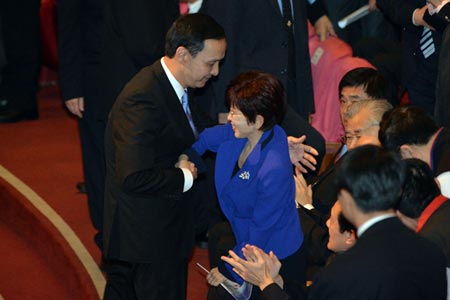by Brian Hioe
語言:
English
Photo Credit: CNA
The More Things Change, The More They Stay The Same
WE MIGHT BEGIN our examination of Eric Chu, by noting, just on the level of superficial appearances, to what extent Eric Chu resembles Ma Ying-Jeou. Chu and Ma are both tall, clean cut, and soft-spoken as politicians. Speculatively, perhaps it is that Chu and Ma as politicians with a similar “style” as politicians are vaguely reflective of some political ideal within the KMT itself as to how politicians should conduct themselves within KMT ideology and party culture. But superficial appearances aside, politically there, too, seems to be little substantive difference between the two. And that may ultimately be quite unfortunate where the survival of the KMT is concerned.
As the saying goes: “The more things change, the more they stay the same.” So if it is that through Chu replacing Hung Hsiu-Chu would reflect that the KMT still retains the ability to adapt—to take emergency measures in order to save itself at a moment of crisis when it looks like the KMT may be on its way out of Taiwanese politics for good—it is that Hung was the exception to the rule as an outlier political candidate and Chu reflects a return to normalcy.
 Chu and Ma at the party congress which led to Chu’s replacing Hung Hsiu-Chu as presidential candidate of the KMT. Photo credit: CNA
Chu and Ma at the party congress which led to Chu’s replacing Hung Hsiu-Chu as presidential candidate of the KMT. Photo credit: CNA
And so the nomination of Chu would reflect that the KMT has learned little from the past year. Apart from that Chu’s political policies will not actually be so substantially different from those Hung put forward, except Chu will present them more carefully, Chu is little more than a second Ma Ying-Jeou. Given that Ma was a president with a nine percent approval rating, lambasted last year as “Bumbler Ma” during the Sunflower Movement, the KMT would seem to have learned very little.
Actually, as a representative of Ma Ying-Jeou’s “Mainlander faction” of the KMT which is the current political establishment, Chu represents the last, desperate attempts of the “Mainlander faction” to cling to power. If Chu will still probably lose to Tsai Ing-Wen, Chu would represent the desperate attempt of the “Mainlander faction” in attempting to cling to power in Taiwan.
If international commentators previously viewed Ma Ying-Jeou as Taiwan’s salvation against the pro-independence rhetoric of Chen Shui-Bian, in offering the possibility of a peaceful ceding of Taiwanese sovereignty to China, it is funny to observe them transferring their adulation to Eric Chu in the present. But despite his long standing significance in the Taiwanese political scene as a key player of the KMT, it is that Eric Chu is now only rising to the attention of Anglophone observers. We might venture an examination of Chu’s background, his origins, and his political career to date. For it may be that Chu is little else than Ma Ying-Jeou’s ghost.
Chu and Ma: A Shared Background Out of the KMT Establishment
LIKE MA, CHU would seem to have benefitted from the political connections that came from being born into a longstanding KMT political family. Chu’s father, Chu Chang-Hsing, was a KMT military figure, was Taoyuan provincial assemblyman, and also served as a member of the National Assembly. By marriage, Chu’s father-in-law, Kao Yu-Jen, has served for over two decades as a member of the KMT Central Committee.
It would be that Chu’s rise to political power came through his family ties. Previously a professor of accounting at City University of New York after completing a Ph. D at New York University, Chu entered politics in 2001 by running for and winning the seat of magistrate of Taoyuan county—no doubt playing off of his father’s political connections in the region. As a rising political star, Chu would then be appointed as vice-chairman of the KMT from November 2008 to October 2009, then be appointed vice premier of the ROC by a victorious Ma Ying-Jeou. In 2010, however, Chu would resign to run for mayorship of New Taipei City. As incumbent, Chu would win victory again in 2014 elections—this despite the battering of the KMT in 2014 elections which left New Taipei City the only large city the KMT still has control over.
Chu and his family have benefitted materially from his political position. During the past twelve years of Chu’s political career, FiberLogic Communications, which was founded by Chu’s father-in-law, has secured government projects worth 1.2 billion NTD. Concern has been raised in the past about the corporate ties of relatives of Chu such as his brother, Leader Chu, and his wife, Kao Wan-Ching. According to a Control Yuan report, Chu owns eleven plots of land in Taipei, Tainan, and Taoyuan county and three homes in Shilin and Neihu worth more than 100 million NTD. Chu now faces increasing scrutiny regarding his father-in-law’s business ties.
This is not so different from Ma Ying-Jeou himself. Ma himself is the son of high KMT official Ma Ho-Ling; though at various times the elder Ma actually opposed his son’s political ambitions, Ma’s political connections through his father were no doubt instrumental in his son’s political rise. Actually, perhaps it is that we can point to the ideological underpinnings of Ma’s bent on unification—apparently above rational political concerns—in his father. Ma Ho-Ling was a man who, after all, who had the words, “Replace independence with gradual unification, strengthen China and work towards unification,” inscribed on his funeral urn when he died in 2005.
But the rise of politicians as Ma and Chu out of prominent political families is indicative of how KMT leaders come to power, less through individual merit, but through familial connections. This more broadly towards the domination of the KMT by powerful and often quite wealthy political families. And if Hung was actually not from a prominent political family, her replacement by Chu just signifies a return to precedent for the KMT.
 Hung and Chu shaking hands at the party congress in which Chu replaced Hung. Photo credit: CNA
Hung and Chu shaking hands at the party congress in which Chu replaced Hung. Photo credit: CNA
Apparently, if the rise of Hung signified the inability of the KMT to adapt to changing circumstances, given Hung’s extremism about cross-strait relations, so, too, would the return to a political candidate as Eric Chu. Hung was an extremist reaction against the eruption of last year’s Sunflower Movement and the rising tide of Taiwanese identification which followed, in which extremist elements of the KMT threatened to take control of the KMT. It seemed that the reaction to the wave of sentiment against the KMT as confirmed by the defeat of the KMT in nine-in-one elections was to attempt to learn nothing, fail to adapt, and return to the good old ways in the hopes that this would make the bad dream of Taiwan’s young rising up against the KMT disappear.
If Hung was an extremist reaction to the crisis of the KMT, Chu is a return to the status quo of the establishment. And it seems the KMT would still to have failed to learn anything from the past year. The response to a year in which Ma’s popularity dropped to a mere nine percent would be to put in another individual not so different from Ma.
Conclusion: Eric Chu and the Crisis of the KMT
IF IN THE past year we have already seen one crisis of the KMT on the basis of its defeat in nine-in-one elections, likely it is that Chu’s probable defeat to Tsai Ing-Wen would provoke another crisis. Actually, Chu’s displacement of Hung would represent Ma’s “Mainlander faction” which is the current establishment of the KMT, retaining control of the KMT against from the radicals who had arrayed themselves behind Hung. Despite Hung having previously towed Ma Ying-Jeou’s line as a member of the “Mainlander faction”, it would appear that the individuals who arrayed themselves behind Hung were largely extremists of the deep blue variety who were too much even for the “Mainlander faction”.
But the rise of Chu would certainly represent little else than the last vestiges of the Ma-led “Mainlander faction” clinging to power. And in this sense, if Chu is but Ma’s ghost, it would appear that the ghost of Ma Ying-Jeou is one which waits to be exorcised.



